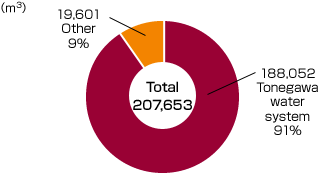 Web Content Display
Web Content Display

Basic Policy
The Advantest Group pursues operations encompassing the “3(three) Rs” (reduce, reuse, and recycle) with the aim of realizing a recycling society.
In addition, the Group is building up its parts-separation initiatives that were initially launched in fiscal 2009, pursuing efforts to recover valuable materials from waste in a manner that fully complies with all relevant laws and regulations, and conducting proper management and disposal of waste generated in the course of business operations.
Change in Waste output and recycling rate
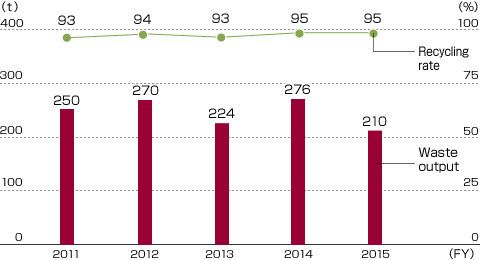
Scope of waste data: Advantest Group (business locations in Japan)
*Modified recycling rate
The calculation method used has been modified retroactively in line with the changes in recycling methods for general waste.
Breakdown of waste types in FY 2015
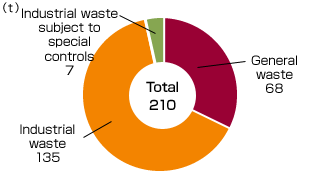
FY 2015 waste treatment Breakdown
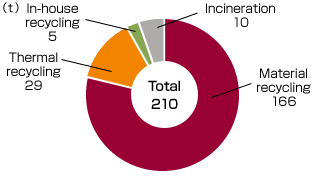
Memoranda of Understanding (MOUs) Entered into with Waste Disposal Service Providers Stipulating Exclusion of Antisocial Forces
Companies have been imposing written obligations stipulating that contractual relationships may be terminated if the counterparty is found to be an anti-social organization. This is premised on ordinances established by the Tokyo Metropolitan Government and other municipalities calling for the elimination of crime syndicates
Moreover, the Japan Business Federation (Keidanren), in calling on companies to overhaul their corporate behavior, is recommending that they conclude such written agreements as one means of ridding society of anti-social forces.
In accordance with ordinances calling for the exclusion of criminal elements and in line with recommendations of Keidanren in that regard, the Advantest Group’s compliance initiatives entail concluding Memoranda of Understanding with all waste disposal service providers involved in our business dealings, stipulating that contractual relations may be terminated if it is discovered that a business partner acts as an anti-social organization.
Eco-friendly Recycling in Employee Cafeteria
We recycle the leftover food generated by the Advantest Gunma R&D Center’s employee cafeteria. The leftovers are processed into compost. Some of the compost is then used to fertilize an onsite vegetable garden, and some is distributed to employees at no cost. Produce from the garden is used in meal preparation at the cafeteria. Also, used cooking oil goes to a recycling business, where it is processed into biodiesel fuel for reuse.
Eco-friendly recycling

Effective Use of Water Resources
Advantest’s main water resource use applications are the operation of air conditioners, kitchen use, toilet cleaning, and drinking. At our main bases we use water for industrial use efficiently. In addition to using this water for cleaning the toilets, we also use it with roof-mounted sprinklers to improve cooling in the summer. (It should be noted that approximately 90% of the discaharged water produced by Advantest Group is classed as domestic sewage; currently, domestic sewage cannot be recycled)
Advantest’s development and manufacturing sites in Japan are located in Gunma Prefecture and Saitama Prefecture and use water resources from the Tonegawa River. In order to protect the Tonegawa River’s water resources we carry out forest protection activities in the Kusatsu-machi National forest in Gunma Prefecture, the source of the river.
Of course, every member of our staff takes care not to waste water, and strives to make effective use of water resources.
Trend in water usage/discharged water
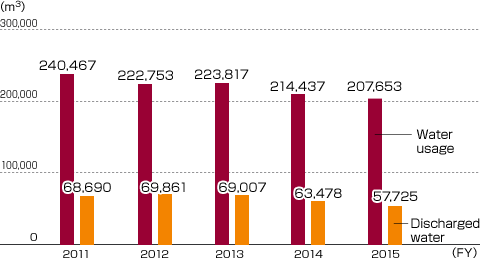
Amount of Tonegawa River water system usage
